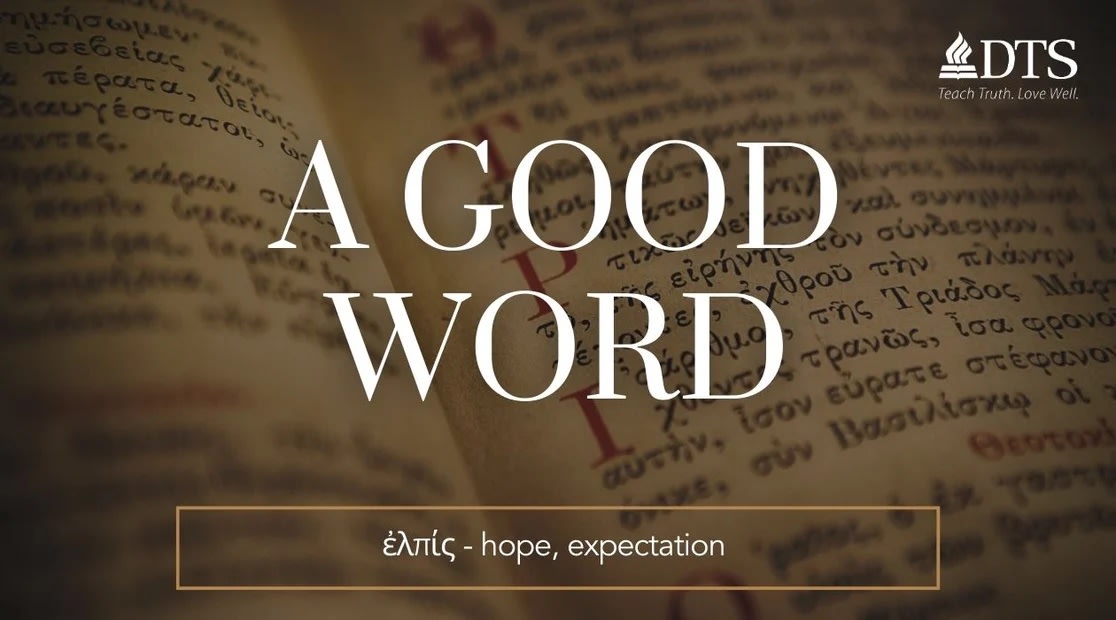A Good Word: ἐλπίς – Hope, Expectation

The New Testament mentions “hope” as one of the cardinal Christian virtues (along with “faith” and “love”) at least five times. The New Testament reveals two prominent features of Christian hope that encourage us to rejoice, abound, and be steadfast in hope even in these challenging days (Romans 12:12; 15:13; 1 Thessalonians 1:3).
The first feature of Christian hope is its certainty.
Hope in the New Testament most often refers to our expectation of future salvation in Christ. It’s grounded in God’s sure promises about spiritual deliverance and eternal life. In biblical terms, hope is a confident, eager anticipation of future blessing because it focuses on God’s plans and purposes. It is not idealistic wishes or unfounded optimism (“I hope my team wins big this season”; “I hope I get that promotion”). It is not self-confidence or the power of positive thinking (“I know I can handle this”; “If I really wish for it hard enough, it will come true”). Biblical hope is based on what He says He will do in our lives and in our world. Notice that Paul’s descriptions of hope in Romans 8:18–25 use phrases like “eager expectation,” “waiting with confidence,” “patiently looking forward,” “tenacious longing.” Christians have an assured hope because it rests in the faithful God who has shown us His steadfast love in Christ (Romans 5:5–6).
The second feature of biblical hope is its challenging context.
The New Testament calls for hope in settings where our expectations have not been met and the promises have not yet been fulfilled. We eagerly await certain blessings, but we haven’t seen them yet. Paul captures this succinctly in Romans 8:24–25: hope that is seen is not actually hope. We hope for what we don’t currently possess but eagerly anticipate it nonetheless. The nature of Christian hope is that we need it most—and it shines brightest—in our darkest moments, in the genuine sufferings and tragedies of a broken world. Hope is not blind to the problems of real life. We understand the realities but still wait fervently for God’s solution. This calls to mind the vivid references to “groaning” in Romans 8:22–23: we groan within ourselves, and the whole creation groans too!
Christian hope encompasses this larger context of human society and culture as well. It’s not just about me or you, as though the whole universe revolves around our feelings and our problems. In Romans 8:18–22, Paul lays out the larger story of God’s good creation—past, present, and future—in very realistic terms. It’s a thumbnail sketch of world history from Genesis to Revelation: what has gone wrong, what the solution is, and how God will ultimately transform everything.
Hopeful Christians confidently anticipate the fulfillment of God’s plan to restore and renew the whole creation to His original design. Hope enables us to see our own situation and that of the world always through the lens of God’s sovereign and gracious purpose in Christ.
About the Contributors

Buist M. Fanning
Buist Fanning has taught at DTS for more than 40 years, while serving also in various leadership positions at his local church and in teaching Christian workers in 10 foreign countries. His passion is to know God and make Him known around the world and to see people transformed by the message of the Bible. His major teaching duties and research interests are New Testament Greek syntax and discourse analysis; New Testament criticism and backgrounds; and exegesis and theology of Romans, Pastoral Epistles, Hebrews, James, Peter, Jude, and Revelation.
